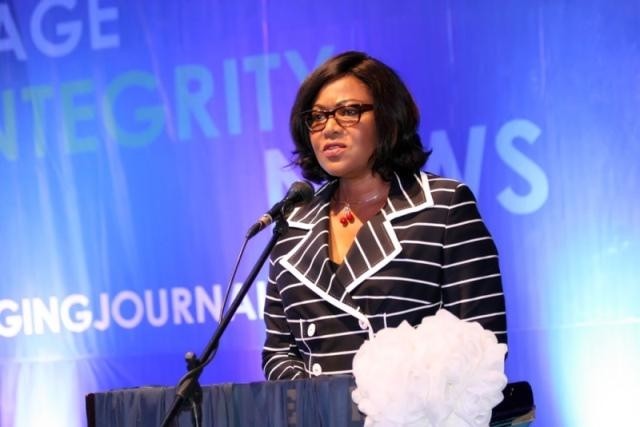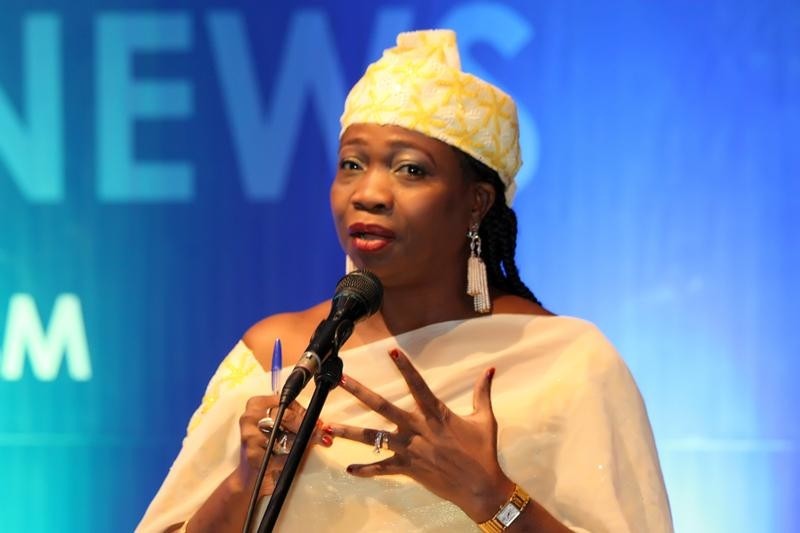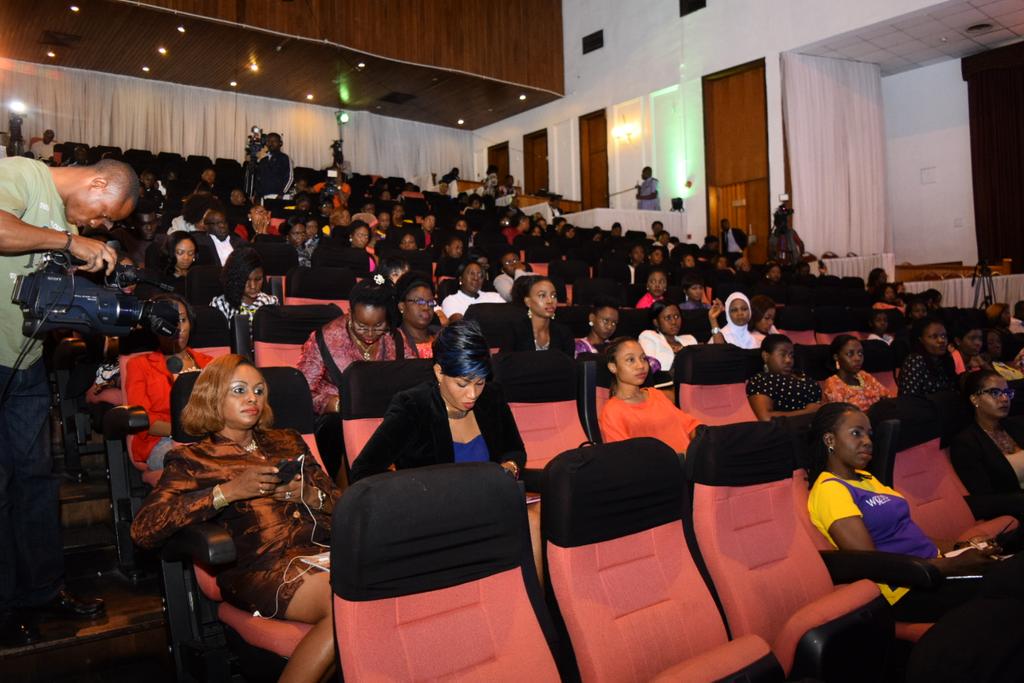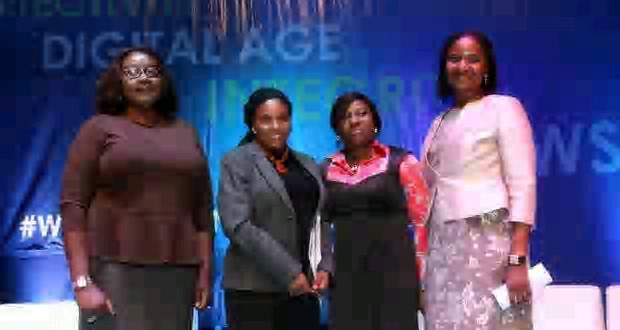When women talk, they talk deeply, driving in the details in a manner that make for profound comprehension. That was the experience recently at the 2015 Women in Journalism conference held in Lagos, writes Hannah Ojo.
The day-long conference hosted by Adesuwa Onyenokwe and SeunP of the Nigerian Info FM paraded a galaxy of stars in the Nigerian journalism space from both broadcast and the print sector.
Themed “Truth and Objectivity in the Digital Age”, the convener of the conference, Mr. Yomi Owope, set the tone for the overpowering insights at the gathering when he remarked that the swift adoption of mobile platforms by readers is pushing media owners to implement new channels and technology to enhance speed.
Bemoaning the fact that Nigerian newspapers are not taken seriously abroad, he advised leaders in the media industry to invest in people by exposing them to innovative ways of engaging in a new generation of mobile-savvy customers in order to be relevant in the industry.
Leading the array of star journalists who spoke at the conference was Senator Chris Anyanwu, journalist and former magazine publisher. Delivering a keynote address titled “Courage is needed in our Day”, she stated that social media has become the primary access point for news. However, she admits that the social media platforms are vulnerable and full of false information which has very high social consequences.

“The challenge of journalism today is that journalists have to be ahead of the fast rising social media and maintain the accuracy and reliability of the traditional media. A professional journalist should not consume poisoned tweets; that is lazy journalism and it has terrible consequence on the credibility of the mainstream media. We have to now wake up because the whole communication process is threatened”, she said.
Senator Anyanwu who was presented with an award at the conference for her unwavering commitment to journalism and dedicated service to humanity applauded the convener of the conference for providing a rallying point for women journalists to advance in their career.
Hon. Abike Dabiri, broadcaster who also made a quick appearance at the event acknowledged the role of the new media in the last election saying it made it difficult for election results to be manipulated. Relating it to journalism, the astute politician implored women journalists to explore the digital platform with the aim of making journalism a profession to be proud of.

Editor of This Day, Ms. Ijeoma Nwogwugwu who also graced the occasion gave a presentation on the decline of investigative journalism in Nigeria. She identified ownership influence of media houses and issues of cronyism and funding as part of the reason for the decline of investigations.
Addressing how the FOI act can be made to serve journalist better, she encouraged journalists to do more stories focusing on the judiciary and insisting that the judiciary speed up the court cases brought before them by journalists demanding redress from establishments refusing them access to information.
The conference was not only about talks and presentations; there were also sessions of panel discussions.
Former editor of defunct Next Newspaper, Ms. Kadaria Ahmed moderated a session on the decline of investigative journalism with a panel comprising seasoned broadcaster, Mrs. Stella Din Jacob, Ms, INwogwugwu and Motunrayo Alaka, the Coordinator of the Wole Soyinka Centre for Investigative Journalism.
On what constitutes proper investigative journalism, Ms Nwogwugwu opined that investigative journalism goes beyond the regular news report and analysis, extending to thorough research that goes deeply into unearthing stories which when published should take a major role in influencing decisions and changing the society.
On her own part, Din-Jacob noted that journalists may not be encouraged to venture into more of investigative journalism because they may not be willing to put their life on the line as a result of the poor pay in the industry.
For Alaka, she stated that most newspapers are not being deliberate about investigative journalism; a factor she said was responsible for the decline of the profession.
The ace broadcaster of the Nigeria Television Authority (NTA) fame, Mrs. Bimbo Oloyede brought in the subtlety expected of a top notch broadcast journalist in delivering a speech which earned her not just the applause of the audience but a standing ovation.
Using the example of liquids in a transparent bottle, she said of truth and objectivity in the digital age is a question of whether the glass is half full or half empty depending on the perspective one looks at it.
“If because we live in a democratic era and everyone can pick their pen and write articles or produce and present programmes and believe that they have become adequate journalists, then it is time for those who are really professionals to show that there is a difference between being an opinionated, judgemental deliverer of information and a researcher whose material can be trusted,” she warned adding that quasi- professionals practising on social media must adhere to the principles of the profession.
Lamide Akintobi presenter with Ebony life TV anchored a session hosting Mrs. Funke Treasure Durodola, the GM of Radio Nigeria, veteran broadcaster, Ruth Benamaisia Opia and Sahara’s reporter’s Omoyele Sowore who joined the discussion through Skype.
Responding to the question of who should be the watch dog in the digital age, Mrs. Durodola said news and forms should guide journalists in their practices.
“The way we share and ingest news has radically changed with social media. In this digital age, there is a lot of rush to break the news so they don’t necessarily keep up with the form, they don’t have credibility as a top priority. Now how does that become a thing we can change if we can?”, Mrs Durodola queried.
Omoyele Sowore affirmed his stance on the democratisation of the news process saying that social media has opened up a community where everyone can participate in the process of news creation and distribution.
Benamaisia countered his assertion on the ground that the danger of having emergency journalists could make the profession to lose form.
Being a conference aimed at developing women journalists to take charge of the media space in a digital age, there was a panel discussion on career advancement for women . The panel anchored by Tabia Princewill featured Ifeyinwa Omowole, senior editor at News Agency of Nigeria (NAN) and president of National Association for Women Journalists (NAWOJ), Funke Egbemode, MD/CEO of New Telegraph, Ikeddy Isiguzo, chairman editorial board of the Vanguard newspaper and Peju Akande of Sabi news.

Isisguzo said many journalists do not advance in their career because they see journalism as a passage, adding that for those who came into the career focused, it is easy for their bosses to notice them whether they are men or women.
Rejecting the insinuation that women tend to go into broadcast journalism because of the glamour, Omowole said most owners of broadcast media prefer women to be presenters probably because they speak better English.
“What I tell young women as they come in is that there is no gender in the newsroom. Your work will speak for you and once you work hard, somebody will definitely notice you and you will get your respect. In journalism there is no gender”, she affirmed.
Also lending her voice to the no gender in the newsroom argument, Funke Egbemode advised women journalists not to allow themselves to be pigeonholed into covering the soft beats only.
“You are either a journalist who wants to look for the ladder, stay on the ladder and climb it or you are not. I do not think that women should write fashion or write about food. It is not particularly something that they should be forced to do. A lot of women think that journalism is a job, it is a calling and if you don’t see it as a career, you’re going nowhere”, she stated.

On mentoring the new generation to grow, Egbemode said it is easier for the mentor if the mentees are willing.
“When you have 20 reporters, you don’t have to concern yourself with the one who has menstrual cramps or who wants to spend a whole day at home because her daughter is having immunization. I had all my babies on the job. You can actually do the job and have babies. I had a baby on a Saturday and my column still came out that Saturday. It is all about managing your time and deciding whether you are climbing that ladder all the way to the top”, she stated.
Agatha Amata, CEO of Rave TV and Host of Inside Out with Agatha in the company of representatives from the banking industry also gave useful insights to women on funding journalism enterprise. Although the programme started behind scheduled, the insights gathered at the conference inspired participants who left with a renewed sense of motivation to lead the digital space in the journalism.

